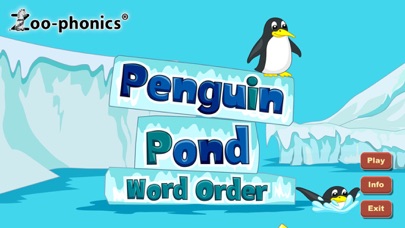
**GAME INTENDED FOR iPADS AND LARGE SCREEN PHONES**
Could your child help Zoophonia and the penguins rearrange their ice-floes*? Zoophonia will remind the child to start with the sentence that starts with a capital letter. She will then read the word aloud. Starting with the word with the capital letter, click on this word ice-floe to temporarily remove it from the sentence. Zeke will read the word aloud. Slide the remaining ice-floes sideways to create a new gap. Click on the word ice-floe in front to send it back to start the sentence. It may take some rearranging before the sentence is correct. Remind your child: 1) A capital letter starts a sentence. 2) A punctuation mark ends the sentence. Zoophonia will read the completed sentence aloud. Remind your child to read along with her.
INTERESTING WORD FACTS: *The word “ice-floes” refers to a block or sheet of ice that is unconnected and floats in the water. Isn’t it interesting? The word “floe” is like “flow” and means basically the same thing here. The word “floe” is a noun. The word “flow” is a verb. However, “flow” can also be a noun (“a flow of water”). We love words and their meanings!
Lesson Objective. The child will:
- use critical thinking skills
- use eyes to track from left-to-right
- follow directions
- make decisions
- learn how to navigate and manipulate interactive elements on a screen using eye-hand coordination
- have a vehicle to practice sound-blending using Body Signals if needed
- learn basic reading skills
- become aware of sentence structure, including uppercase letter and punctuation usage
- understand that words and sentence structure get more challenging as the she or he gains phonics and reading skills
About Zoo-phonics
Teach your students the alphabet in TWO WEEKS! Faster than you ever expected your students will be reading, spelling and writing!
The Zoo-phonics Multisensory Language Arts Program is a kinesthetic, multi-modal approach to learning all aspects of language arts, including vocabulary development and articulation, based on phonics and phonemic awareness.
The principle of Zoo-phonics maximizes understanding, memory, utilization and transference to all areas of the reading, spelling and writing process in a playful and concrete manner.
Zoo-phonics is a method developed to make children strong readers and spellers using a “phono” (hearing), “oral” (speaking), “visual” (seeing), “kinesthetic” (moving), and tactile (touching)—whole brain approach. Students actually learn the sounds of the alphabet and advanced phonemic concepts through an easily understood, concrete method of presentation.
Zoo-phonics uses animals drawn in the shapes of the letters for ease in memory. A related body movement is given for each letter. This concrete approach cements the sounds to the shapes of the letters. Lowercase letters and their sounds are taught first (needed 95% of the time in text), capital letters and letter names are taught later.
Zoo-phonics also provides a springboard for all other academia such as math, art, music, cooking/nutrition, social studies, science, grooming, physical education and sensory/drama.
Every aspect of the program has been field-tested and found to be effective. Educational research repeatedly supports the focus of phonics in early reading programs, as well as the educational benefits of pictorial mnemonics and kinesthetic approaches to learning that are unique to Zoo-phonics.
Currently Zoo-phonics is used throughout the United States and internationally as a highly effective language arts program.



